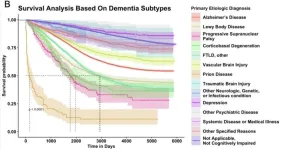(Press-News.org) Bethesda, MD (Feb. 28, 2024) — Today, the American Gastroenterological Association (AGA) published a white paper on the future of inflammatory bowel disease (IBD) care in the United States. AGA highlights the current barriers to care and calls for collaboration among our healthcare community, insurers, pharmaceutical companies and legislators to improve and optimize care for the more than three million Americans living with IBD.
IBD is a complex disease that requires a vigilant and coordinated multidisciplinary approach. Over the last two decades, there has been a revolution in therapeutics fueled by exciting research and development that continues to expand and evolve the treatment armamentarium for IBD, offering hope for better disease control. However, the most effective therapies for IBD are cost prohibitive and have become inaccessible due to insurer-mandated barriers to care such as prior authorization and step therapy.
AGA highlights seven barriers to care:
Restricted access to treatment through prior authorization and step therapy
Prohibitive drug costs
Forced non-medical switching
Coverage gaps in disease monitoring
Inadequate coverage for multidisciplinary care
Limited access to IBD specialists
Intersecting identities leading to inequality
“Unaffordable drug costs, step therapy, and other insurer-mandated barriers are fixable problems. Every day, we see people that have been harmed by delayed and inadequate care. Solving these barriers would lift an unimaginable weight off our patient’s shoulders and allow them to lead healthier lives,” said M. Anthony Sofia, MD, co-first author and IBD specialist at Oregon Health and Science University. “We must work together to collaborate on solutions to strengthen and advance the care for all people with IBD.”
AGA’s 12-point plan for the future of IBD care:
The lived experiences and valuable insights from both patients and expert clinicians should be reflected in the data and research represented in the field.
AGA recognizes the powerful benefit of individually tailoring IBD therapy based on risk, comorbidities and response and encourages all stakeholders to do the same.
As a field, we need to move beyond insurer-mandated step therapy and fail first policies.
AGA urges insurers to cover all necessary disease activity and drug level monitoring, which will ensure patients are able to achieve treat to target driven outcomes.
Streamlined and expedited expert reviews should be guaranteed to all providers when they are mandated by an insurer.
To ensure transparency and accountability, AGA wants to require that payors publish their denial and appeals data.
AGA believes that holistic patient-centered multidisciplinary care, including psychosocial and dietary support, be covered by insurance. Having access to such care contributes to improved patient resilience and well-being which will lead to decreased healthcare utilization and better health outcomes.
AGA supports the creation and continuation of a variety of patient education programs to improve health literacy and awareness of complex health care systems.
AGA is committed to improving patients’ access to expert specialized clinical IBD care. This includes flexible delivery models to ensure that underserved populations are being reached. In addition, AGA supports training and educating specialty providers across the spectrum of medical care (advanced practice providers, nurse educators, etc.) to increase the number of qualified IBD providers.
Piloting innovative shared incentive partnerships between high value sub-specialty care practices and payors will be a new shared goal.
AGA wants to engage pharmaceutical partners in developing equitable programs to address prohibitive drug costs while also expanding patient access and support.
AGA plans to continue to advocate for legislation to make access to therapy equitable for Medicare and Medicaid patients.
AGA published this white paper online on Feb. 28, 2024, in Clinical Gastroenterology and Hepatology, and it will appear in the May 2024 print issue.
Groups interested in collaborating with AGA to advance IBD care should contact Kathleen Teixeira, AGA Vice President, Public Policy and Advocacy, at kteixeira@gastro.org.
IBD Resources
Patient info on IBD
My IBD Life
About the AGA Institute
The American Gastroenterological Association is the trusted voice of the GI community. Founded in 1897, the AGA has grown to more than 16,000 members from around the globe who are involved in all aspects of the science, practice and advancement of gastroenterology. The AGA Institute administers the practice, research and educational programs of the organization. www.gastro.org.
AGA is now on Instagram.
Like AGA on Facebook.
Follow us X @AmerGastroAssn.
Check out our videos on YouTube.
Join AGA on LinkedIn.
END
AGA announces 12-point plan to improve the care of all patients with inflammatory bowel disease (IBD)
New white paper addresses the many barriers to providing patients with IBD high quality, high value care and proposes tangible solutions.
2024-02-28
ELSE PRESS RELEASES FROM THIS DATE:
Shedding light on the intricacies of numerical simulations of soil behavior
2024-02-28
A solid understanding of soil mechanics and behavior is one of the fundamental pillars of geotechnical engineering. The stability and resilience of many modern geotechnical structures, including building foundations, dams, bridges, and embankments, rely on appropriate modelling based on accurate measurements of soil properties.
Over the past few decades, unprecedented growth in computing power has turned numerical simulations of soil behavior into an attractive tool in geotechnical engineering. By representing soil as a set of interacting particles, numerical simulations can help researchers understand complex soil behavior under various conditions. Moreover, numerical ...
Promising pathways to simplified Alzheimer's diagnosis unveiled in groundbreaking study
2024-02-28
Washington D.C., Feb. 28, 2024- The Global Alzheimer’s Platform Foundation®, (GAP) is releasing the first results from the Bio-Hermes-001 Study. This study in over 1000 community-based participants from throughout the US compared the results of blood and digital biomarkers with brain amyloid PET scans or cerebrospinal fluid assays. The study revealed a strong correlation between several blood tests, particularly p-tau 217, with the presence of amyloid plaques in the brain, a diagnostic hallmark of Alzheimer’s disease (AD). This relationship was demonstrated across the entire study ...
Understanding genetic risk could save sight and predict multiple sclerosis earlier in young people
2024-02-28
Young people could be spared from going blind by a new genetic risk tool that could also help diagnose multiple sclerosis (MS) earlier, to start effective treatments.
Optic neuritis is a condition that affects people of all ages, but especially young adults, usually manifesting in blurred vision and sometimes pain when moving the eyes. Up to half of people affected in the UK eventually go on to develop MS – often many years later. Emerging evidence indicates that starting the very effective MS treatments earlier may improve long term health.
Optic neuritis occurs because of swelling in or around the optic nerve. For those with MS-related optic neuritis, the swelling subsides ...
Cannabis use linked to increase in heart attack and stroke risk
2024-02-28
Research Highlights:
An analysis of survey data for 430,000 adults in the U.S. found that using cannabis has a significant association with an increased risk of heart attack and stroke, independent of tobacco use, with higher odds among the adults with more frequent use (more days of use per month). The most common method of cannabis use was smoking, followed by eating or vaporizing it.
The increase in the combined risk of coronary heart disease, heart attack and stroke was similar to the risk among the subset of adults who had never used e-cigarettes but did use cannabis.
Embargoed until 4 a.m. CT/5 a.m. ET Wednesday, February ...
Researchers model blood-brain barrier using “Tissue-in-a-CUBE" system
2024-02-28
A research team at the RIKEN Center for Biosystems Dynamics Research (BDR) in Japan has succeeded in establishing a model of the blood-brain barrier using modularized tissue derived from human cells. The “Tissue-in-a-CUBE” is a small cubic structure that could provide a boost in the drug discovery field and be used as an alternative to animal models in pre-clinical studies. The study was published in Communications Biology on February 28.
The blood-brain barrier is a strict gatekeeper around the brain that prevents foreign substances in blood from entering the brain. Although protective, the barrier poses challenges when treatments ...
Study identifies blood biomarkers to predict risk of cardiovascular disease in patients with rheumatoid arthritis
2024-02-28
KEY TAKEAWAYS
Rheumatoid arthritis is associated with increased risk of cardiovascular disease, but it can be challenging to predict which individuals are at highest risk.
Mass General Brigham experts in rheumatology and cardiovascular disease worked together to identify six biomarkers found in blood samples that can predict future risk of arterial inflammation among patients with rheumatoid arthritis.
The team is now working to test these biomarkers in a larger and more long-term cohort of patients with rheumatoid ...
Ai finds key signs that predict patient survival across dementia types
2024-02-28
New York, NY [February 28, 2024]—Researchers at the Icahn School of Medicine at Mount Sinai and others have harnessed the power of machine learning to identify key predictors of mortality in dementia patients.
The study, published in the February 28 online issue of Communications Medicine [10.1038/s43856-024-00437-7], addresses critical challenges in dementia care by pinpointing patients at high risk of near-term death and uncovers the factors that drive this risk. Unlike previous studies that focused on diagnosing dementia, this research delves into predicting patient prognosis, shedding light on mortality ...
Light stimulates a new twist for synthetic chemistry
2024-02-28
Molecules that are induced by light to rotate bulky groups around central bonds could be developed into photo-activated bioactive systems, molecular switches, and more.
Researchers at Hokkaido University, led by Assistant Professor Akira Katsuyama and Professor Satoshi Ichikawa at the Faculty of Pharmaceutical Sciences, have extended the toolkit of synthetic chemistry by making a new category of molecules that can be induced to undergo an internal rotation on interaction with light. Similar processes are believed to be important in some natural biological systems. Synthetic versions might ...
More than just neurons: A new model for studying human brain inflammation
2024-02-28
LA JOLLA (February 28, 2024)—The brain is typically depicted as a complex web of neurons sending and receiving messages. But neurons only make up half of the human brain. The other half—roughly 85 billion cells—are non-neuronal cells called glia. The most common type of glial cells are astrocytes, which are important for supporting neuronal health and activity. Despite this, most existing laboratory models of the human brain fail to include astrocytes at sufficient levels or at all, which limits the models’ utility for studying ...
Urgent need to develop best practices to advance use of AI in cardiovascular care
2024-02-28
Statement Highlights:
The American Heart Association encourages research and development of artificial intelligence (AI) and other related tools and services that may support and enable more precise approaches to cardiovascular and stroke research, prevention and care.
Academia, industry and governments worldwide are pouring resources into developing AI-based tools to transform how and when health care is delivered.
While promising research is beginning to emerge in many areas of cardiovascular medicine, AI-based tools, algorithms and systems of care have not yet been proven to improve care enough to justify widespread use.
AI and machine learning digital tools currently exist that ...
LAST 30 PRESS RELEASES:
Cost of copper must rise double to meet basic copper needs
A gel for wounds that won’t heal
Iron, carbon, and the art of toxic cleanup
Organic soil amendments work together to help sandy soils hold water longer, study finds
Hidden carbon in mangrove soils may play a larger role in climate regulation than previously thought
Weight-loss wonder pills prompt scrutiny of key ingredient
Nonprofit leader Diane Dodge to receive 2026 Penn Nursing Renfield Foundation Award for Global Women’s Health
Maternal smoking during pregnancy may be linked to higher blood pressure in children, NIH study finds
New Lund model aims to shorten the path to life-saving cell and gene therapies
Researchers create ultra-stretchable, liquid-repellent materials via laser ablation
Combining AI with OCT shows potential for detecting lipid-rich plaques in coronary arteries
SeaCast revolutionizes Mediterranean Sea forecasting with AI-powered speed and accuracy
JMIR Publications’ JMIR Bioinformatics and Biotechnology invites submissions on Bridging Data, AI, and Innovation to Transform Health
Honey bees navigate more precisely than previously thought
Air pollution may directly contribute to Alzheimer’s disease
Study finds early imaging after pediatric UTIs may do more harm than good
UC San Diego Health joins national research for maternal-fetal care
New biomarker predicts chemotherapy response in triple-negative breast cancer
Treatment algorithms featured in Brain Trauma Foundation’s update of guidelines for care of patients with penetrating traumatic brain injury
Over 40% of musicians experience tinnitus; hearing loss and hyperacusis also significantly elevated
Artificial intelligence predicts colorectal cancer risk in ulcerative colitis patients
Mayo Clinic installs first magnetic nanoparticle hyperthermia system for cancer research in the US
Calibr-Skaggs and Kainomyx launch collaboration to pioneer novel malaria treatments
JAX-NYSCF Collaborative and GSK announce collaboration to advance translational models for neurodegenerative disease research
Classifying pediatric brain tumors by liquid biopsy using artificial intelligence
Insilico Medicine initiates AI driven collaboration with leading global cancer center to identify novel targets for gastroesophageal cancers
Immunotherapy plus chemotherapy before surgery shows promise for pancreatic cancer
A “smart fluid” you can reconfigure with temperature
New research suggests myopia is driven by how we use our eyes indoors
Scientists develop first-of-its-kind antibody to block Epstein Barr virus
[Press-News.org] AGA announces 12-point plan to improve the care of all patients with inflammatory bowel disease (IBD)New white paper addresses the many barriers to providing patients with IBD high quality, high value care and proposes tangible solutions.





